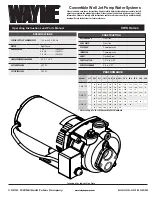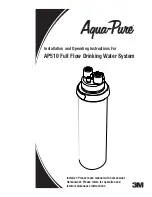
12
2. In order to service the water heater in the event the heat exchanger needs to be flushed from lime
deposits, tee fittings with shut off valves and service connections to hoses should be installed.
Also install a shut off valve to the hot water supply to isolate the service tee fittings. A plumbing
installation kit, which includes these fittings and a pressure relief valve, is available from your
supplier. Refer to piping diagrams (fig. 2-5) at the end of Section V.
3. Install a pressure relief valve on a tee connection from the hot water outlet piping from the water
heater. Refer to the piping diagrams (fig. 2-5) and the warning for the Pressure Relief Valve at
the end of Section V on Water Connections.
4. In cold climates where piping can freeze during an extended power failure, drain solenoid valves
should be installed on the cold and hot water supply lines to allow water to drain from the water
heater when power is interrupted. Refer to the piping diagram “Recommended Piping for Power
Failure Freeze Protection” (fig. 3) at the end of this Water Connections Section and contact your
dealer if assistance is needed.
5. If this water heater is installed in a closed water supply system, such as the one having a back-
flow preventer in the cold water supply, provisions must be made to control thermal expansion.
DO NOT
operate this water heater in a closed system without provisions for controlling thermal
expansion. Warranties do not cover damages from thermal expansions such as pressure bulges
and/or deformities. Your water supplier or local plumbing inspector should be contacted on how
to control this situation.
6. Purge the cold water line prior to connecting to the water heater to remove debris. Debris will
clog the mesh strainer of the inlet filter. The inlet strainer prevents debris from damaging the flow
sensor or clogging the coil. It may need to be cleaned periodically and should be cleaned after
the installation.
DO NOT operate the water heater without the filter in place
.
7. After installation of the water lines, open the main water supply valve and fill the water heater.
While the water heater is filling, open several hot water faucets to allow air to escape from the
water system. When a steady stream of water flows through the faucets, close them and check
all water connections for possible leaks.
8. This water heater may also be connected to a circulating pump or storage tank for increased flow
capacity during high demand periods. Refer to the suggested piping diagrams (fig. 4-5) at the
end of Section V on Water Connections to be used as a guide.
9. Commercial installations may require more than one water heater piped together in a manifold to
supply enough capacity for high temperature and high water flow applications. Special controls
are available from your
Laars
supplier for operating more than one water heater
together. These controls stage the operation of the water heaters for the flow rates and control
the amount of flow through each water heater. Order part# 239-44511-00 for the electronic
manifold control for the first and second water heater and part# 239-44512-00 for the wiring
harness for each additional water heater to be controlled. Instructions are included with these
parts. Use the piping diagram in figure 5 in Section V as a guide.
NOTICE
Take care when using pipe dope or Teflon tape to avoid clogging the inlet screen and water flow
sensor. Wipe off excess pipe dope from threads before connecting to the water heater.
Commercial dishwashers will require either more than one water heater or a storage tank to supply a
sufficient volume of hot water.
Summary of Contents for Everhot IGE-199R Series
Page 13: ...Recommended Piping for a Basic Installation Fig 2 13...
Page 15: ...Recommended Piping for a Circulation System Fig 4 15...
Page 22: ...Wiring Diagram WARNING DO NOT adjust any dipswitch settings on PC board 22...
Page 23: ...Wiring Diagram Schematic 23...
Page 38: ...SCHEMATIC DIAGRAM OF INTERNAL PARTS 38...
Page 39: ...SECTION X PARTS LIST Cabinet Note Can purchase additional controls for remote locations 39...
Page 40: ...Internal Components 40...
Page 41: ...Internal Components 41...
Page 42: ...Electrical Components 42...












































